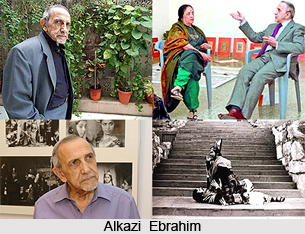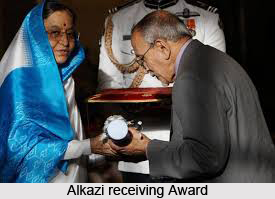 Ebrahim Alkazi was the pioneering director and educator in English and Hindi theatre. He was born in Pune to an affluent business family, with a Saudi Arabian father and Kuwaiti mother. Ebrahim had a religious but liberal upbringing, and learnt Arabic from tutors, English at a Jesuit school, and Marathi Gujarati from his mother. At college in Bombay, he was drawn into acting by Sultan Padamsee, who ran the English-language Theatre Group. He went to England in 1947 to study art, but ended up at the Royal Academy of Dramatic Art, where he received theatre training. Recognized by the British Drama League for work of outstanding merit and winner of the BBC Broadcasting Award in 1950, he refused job offers and theatre agents in London, and returned to India that year to rejoin Theatre Group.
Ebrahim Alkazi was the pioneering director and educator in English and Hindi theatre. He was born in Pune to an affluent business family, with a Saudi Arabian father and Kuwaiti mother. Ebrahim had a religious but liberal upbringing, and learnt Arabic from tutors, English at a Jesuit school, and Marathi Gujarati from his mother. At college in Bombay, he was drawn into acting by Sultan Padamsee, who ran the English-language Theatre Group. He went to England in 1947 to study art, but ended up at the Royal Academy of Dramatic Art, where he received theatre training. Recognized by the British Drama League for work of outstanding merit and winner of the BBC Broadcasting Award in 1950, he refused job offers and theatre agents in London, and returned to India that year to rejoin Theatre Group.
He soon left it to form Theatre Unit, committed to more serious and purposeful theatre, and attracted like-minded people. To allow for regular shows, he converted his rooftop into a beautiful open-air theatre where they performed. Although most of his productions with Theatre Unit were foreign plays done in English, he sought to make them relevant to the Indian consciousness, and they were of a calibre not seen earlier. Sophocles`s Oedipus Rex in the year of 1954, Eliot`s Murder in the Cathedral in 1955, Anouilh`s Antigone in 1957, and Euripides`s Medea in 1960 are remembered for their energy, precision, and aesthetic value. Oedipus Rex stood out along with Sombhu Mitra`s Rakta-karabi at Sangeet Natak Akademi`s National Drama Festival in Delhi. In 1953 he started the monthly Theatre Unit Bulletin, containing articles, reviews, and news of theatre in India and abroad. To equip workers to deal with his kind of rigour and intellectual awareness, he offered an actors` training programme that he named the School of Dramatic Arts. He was also Principal of the Natya Academy, Bombay.
 Ebrahim Alkazi was associated with training many well-known film and theatre actors including Om Shivpuri, Om Puri, Naseeruddin Shah, Manohar Singh, Uttara Baokar, Jyoti Subhash, Suhas Joshi, B. Jayashree, Jayadev and Rohini Hattangadi. This theatre personality has directed over 50 plays, including famous productions of Girish Karnad`s `Thuglaq`, Mohan Rakesh`s `Ashadh Ka Ek Din` and Dharmvir Bharati`s `Andha Yug`.
Ebrahim Alkazi was associated with training many well-known film and theatre actors including Om Shivpuri, Om Puri, Naseeruddin Shah, Manohar Singh, Uttara Baokar, Jyoti Subhash, Suhas Joshi, B. Jayashree, Jayadev and Rohini Hattangadi. This theatre personality has directed over 50 plays, including famous productions of Girish Karnad`s `Thuglaq`, Mohan Rakesh`s `Ashadh Ka Ek Din` and Dharmvir Bharati`s `Andha Yug`.
In 1962 he took over as Director of National School of Drama (NSD), continuing till 1977. As the director of the National School of Drama, Alkazi revolutionized Hindi theatre by the magnificence of his vision, and the meticulousness of his technical discipline. He expanded the duration of the course there to three years, introduced specializations, highlighted the importance of detailed research into each aspect of a play before mounting a production, enforced strict discipline and seriousness, and stressed meticulousness and perfection in coordinating the elements that go into theatre. As a result, NSD`s performances acquired tremendous sophistication and set very high standards, impacting all his students, who later made significant contributions to theatre in their own regions. However, in his scheme of things emphasis fell on single-handed teaching through productions, the desirability of which in a training institution is open to debate.
One of his major directorial contributions was to bring his expertise in fine arts and rare aesthetic sensibility to various performing spaces, costumes, light and set design, and orchestration of large groups on stage. His open-air productions of Rakesh`s Ashadh ka ek din in the backyard of NSD`s first premises in 1962, Bharati`s Andha yug in the Ferozeshah Kotla ruins in 1963, and Karnad`s Tughlaq in the Purana Qila fort in 1974 have become legendary for their innovation and stunning visual impressions. His forte was the theatre of spectacle and grandeur, in which he remains unsurpassed. Although his style lacked warmth, spontaneity, and rooted ness or resonance of Indian reality, with more than fifty productions of foreign and Indian drama, he left a definite legacy by his sophistication, artistic imagination, discipline, and commitment. His major contribution was to impart a seriousness and respectability to theatre, hitherto missing. A discerning connoisseur of art, he now runs a gallery in New Delhi.
He was the first recipient of Roopwedh Pratishtan`s the Tanvir Award in 2004 for lifetime contribution to the theatre. He has received awards including the Padma Shree and the Padma Bhushan for his contribution to theatre.




